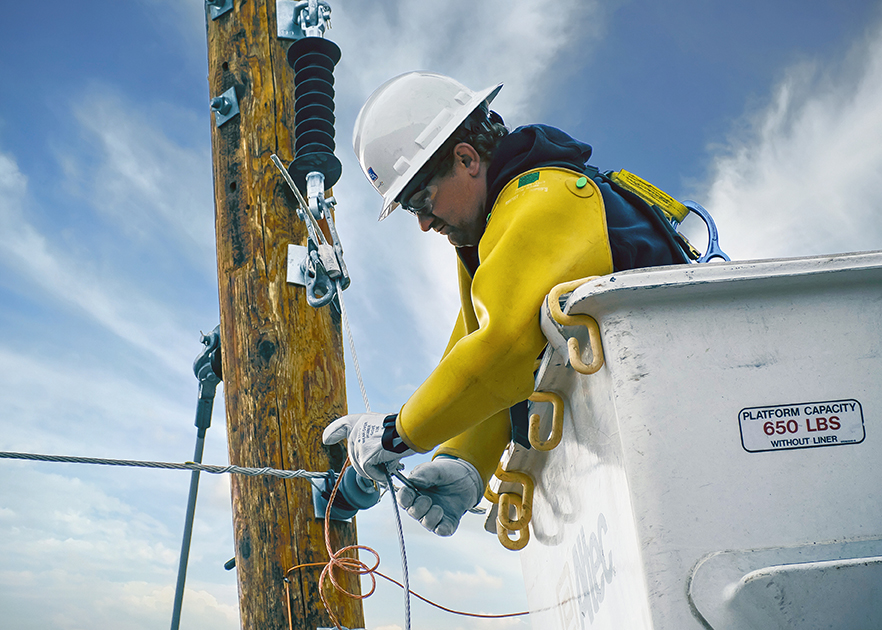If you still receive a printed bill in the mail, consider enrolling in Paperless Billing. Click for Benefits of Text & Email Notifications
×We are committed to safely powering your everyday life.

Electrical contact can result in serious injury, or even death. Tap into our knowledge with these tools and tips to reduce preventable accidents and help keep you and your family safe in and around your homes and businesses.
Follow these tips to keep yourself and those around you safe near power lines and electrical equipment.
It’s important to remember that it is impossible to tell if a power line is energized by looking at it. It’s also hard to tell the different between power lines and other utility lines. Stay at least 10 feet away from any downed line and always assume that it is energized. Keep others away from any downed lines to protect them. Then check that it is within our service territory, and contact us.
There are numerous utility lines buried underground, including power lines. A free and easy way to ensure you’re staying safe is to call 811 to mark utility lines. Some lines will not be located, such as electrical or gas lines that you own on your property.
Learn MoreAlways stay at least 10 feet away from power lines. This includes any equipment you may be on or using – such as ladders or pruners. Contact us to de-energize power lines before completing work. Never climb into a tree that is near or contacting a power line.
When planting trees or planning your home’s landscaping, it is important to select the right tree for the right place. Good landscaping utilizes shrubs and low-growing trees that are compatible with utility lines.
If you feel that you have trees that need to be trimmed or removed because they are too close to our power lines, please fix out an online Tree Trimming Request.
Learn MoreWhen working on outdoor projects, always look up and all around to see if there are any power lines near you or your working equipment. Accidental electrical contact can cause serious injury, or even death. Maintain a 10 foot distance between yourself and your equipment from any utility lines.
Know if your oversized, heavy-equipment, or other type vehicle and whatever you may be hauling has the necessary clearance to safely pass through our service territory without interfering with electric cables across roadways.
If your vehicle/trailer is above this height requirement, contact us to know the specific maximum height requirements for your vehicle and planned route, or to discuss alternative routes.
Contact UsElectric-shock drowning happens when nearby electricity shocks and paralyzes someone, so they can’t swim or help themselves. This happens through accidental contact or faulty wiring. Keep yourself, those around you, and any boats, docks, lights, or sails at least 10 feet away from power lines. Ensure any wiring near water is safe.
If you believe someone or something near water has become energized, use an insulated implement to break contact and move them to a safe location. Immediately call 911 and perform any necessary emergency medical actions.
It’s important to teach your kids the importance of staying safe around electricity. Visit our Kids Corner for useful information.
Ensure your children know to play with toys, fly kites, and climb trees that are not near power lines. Likewise, they should stay away from electrical equipment and fencing, including electrical boxes, power poles, and household meters.
If a toy is ever entangled or touching electrical equipment, abandon it immediately and get an adult to see if it can be safely removed. If it cannot, contact us.
Kids CornerFollow these tips to keep your household safe around electricity.
There are countless appliances in our homes that use electricity to make our lives easier. Be sure to keep yourself safe by taking these tips into consideration:
Remember these tips when using extension cords:
Keep cooking appliances clean to operate properly. Keep combustibles away from cooking surfaces.
If you must cook during an electrical outage, remember to use proper ventilation.
More Home Energy Tips & ToolsKeep electrical heating equipment clean to ensure proper operation. Read labels carefully to ensure they are designed to be used for your needs. Inspect equipment prior to use and check for cracks, broken plugs, and proper connections. Do not use it if there are damaged components. Never leave a space heater unattended.
More Home Energy Tips & ToolsThe improper installation of generators can pose a severe safety hazard for you, your loved ones, and our employees. It may even violate local and state electrical codes. Improperly installed generators can back feed, or re-energize, power lines and endanger those attempting to restore power outages. Contact a certified electrician to properly install your generators.
Generator Safety BlogWater and electricity do not mix. For whatever the reason your home has water inside it, use these tips to stay safe around electricity: